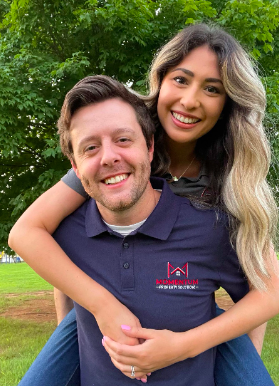"Living Overseas Led to Her Career" with Robin Blackburn
/Photo Credit: Robin Blackburn
Robin Blackburn is a content and social media marketer living in Tomball, Texas – but that’s not what she’s always done. After living overseas for five years, she decided that she wanted to pursue a career in writing copy and creating content. After returning to the U.S. – she made it happen. Now she does it with a focus on creating connections, opening conversations, and building communities.
Can you tell our readers about your background?
My first job out of college was as a French teacher. And I did this for almost 10 years when I realized it was just not something I could see myself doing for the rest of my life. I took some other jobs after that (everything from a technology instructor to teaching spin classes) – and still hadn’t found what I really wanted to do. During the time of various jobs, I had children (two boys) and then my husband’s job took us overseas for five years (to Malaysia and Poland).
What inspired you to start your business?
Living overseas was the kick in the ass I needed to figure out what I wanted to do.
I started a blog while we were overseas to fill my time and keep friends and family back home up-to-date on what we were doing. It included are travels, of course, but also just day-to-day life living in Kuala Lumpur, Malaysia, and Warsaw, Poland. It became my outlet for sharing the good, the bad, and the ugly about being an ex-pat.
When I got to Poland, I found a part-time job helping an international company with their written content – proofreading, writing copy, etc. They taught me a TON – and I loved it! It was all remote work, and the team was great it really gave me the itch to want to write for other people.
I continued working for them for about 18 months and then we returned back to the United States. At this point in time, I needed to make a decision. Would I go back to work in a traditional manner or would I try to make it as a copywriter/content creator? In my heart, I knew exactly what I wanted to do. I wanted to continue to write copy and create content – and I decided to make it happen.
Where is your business based?
I currently work from my home office in Tomball, Texas – but I spend my summers in Upstate New York - and work comes with me wherever I may be. Having a business that could travel was important. I wanted to flexibility to bring work with me – and this work allows for that.
How did you start your business? What were the first steps you took?
I started by finding a few clients on Upwork. And I’ll admit that they were low-paying and not exactly the work I was looking for. But I built up my reputation as someone who consistently created good content and always delivered on time. I always put in 110% to whatever project I found because I wanted to get those five-star reviews. It was important to me that I was always receiving positive feedback and excellent reviews. Once I had that, people started telling others about my work – and business just took off.
What has been the most effective way of raising awareness for your business?
Nowadays, I primarily rely on referrals. Everyone talks about finding clients on social media or through other sources, but I find referrals to be the best way.
Most of my clients have referred me to people in their circle and my clients’ list has grown. There is no better feeling than having a client say, “I’d like to share your contact information with Susy Q…is that okay?” Yes! It’s most definitely okay!
While I have social media and a webpage – they’re mainly for “proof of life” – so that if people need to make sure I’m “legit” they can see that I’m out there and sharing content. But I don’t rely on them to find new clients.
What have been your biggest challenges and how did you overcome them?
My biggest challenge has been work-life balance – and I still don’t have it mastered. I try very hard to shut work down at a reasonable time each night – and not pick it back up until the morning - but it doesn’t always happen. Plus, my husband is the same way – so he’s no good at telling me to get off my phone! I guess I’m still a “work in progress” on this!
How do you stay focused?
One thing I try to do is schedule only one client meeting per day. This allows me to stay focused on content creation. Additionally, I think this helps me put that focus and attention on my client for that day. I have time to prepare for whatever may be on the agenda – without having to worry about my next call.
I also take a look at my list of projects each day and figure out what needs to get done and the approximate amount of time it will take me – creating a schedule for the day. I love a schedule! And I love being organized. It’s that organization that allows me to deliver quality content to my clients without feeling pressed for time or rushed. It also allows for on-the-fly content that clients may need in a rush!
How do you differentiate your business from the competition?
When I started, my clients were amazed that I was always delivering content ahead of due dates – and that continues to be my focus. I know how to write and do research – and so do others. But people also want to know that they can depend on you. They want to know that you are going to meet or exceed their expectations – and that’s what I aim to do.
When I would talk with a new client, I often heard that they had issues with previous content writers delivering on time. I kept hearing it over and over again. I don’t want clients to worry about not getting what they need. I want there to be plenty of time for any revisions and I want them to know that I value them as a client. I put my focus on delivering quality content ahead of deadlines. It’s one of the things I pride myself on – and my clients have always shared this with others as something they appreciate.
What has been your most effective marketing strategy to grow your business?
I have a webpage and social media, but referrals have been the most effective way for me to grow. You can never dismiss the importance of providing quality service to your clients – because when they’re happy, they’ll tell others. This has worked for me consistently. I find that I currently have a waitlist of clients because of referrals.
What's your best piece of advice for aspiring and new entrepreneurs?
Don’t be afraid to say no. Occasionally, people will ask if you can do something that’s not in your scope of work or outside of your comfort zone – and while you could probably do it – you need to be able to say no. You want to showcase your expertise – and people will respect you for saying no to a project that you could do – but just isn’t in your wheelhouse. Additionally, this is a great opportunity for you to refer work to other experts in your network. I love being able to give a referral to some other business owner who has the skills and expertise to deliver on something that I can’t.
What's your favorite app, blog, and book? Why? I’ve got to say that I love LinkedIn. It’s a great way to connect with people and there is a wealth of fantastic information available to you there.
What's your favorite business tool or resource? Why? I use ClickUp to manage all of my projects for all of my clients. It keeps me organized and it’s so easy to use!
Who is your business role model? Why? I have to say my father. He owned his own accounting firm and I saw all of the hard work and effort he put into that business to make it a success. He showed me that hard work does pay off – and he’s been an excellent sounding board as I’ve grown my business.
How do you balance work and life? As I said, I still don’t have this mastered. But I’m working to set better boundaries with clients – and myself – to not constantly be “on.” It’s not easy to do when your job is tied to technology, but I’m going to keep trying.
What’s your favorite way to decompress? I love to read and I love spending time in the kitchen! My family benefits greatly from my cooking!
What do you have planned for the next six months? I’m considering bringing on another copywriter to help with some projects – which is really exciting. This will allow for more growth – and maybe a better work-life balance for me.
How can our readers connect with you? You can connect with me on Instagram: @robinblackburnsmmarketing or at robinblackburnmarketing.com










